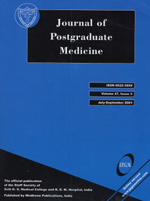
|
Journal of Postgraduate Medicine
Medknow Publications and Staff Society of Seth GS Medical College and KEM Hospital, Mumbai, India
ISSN: 0022-3859
EISSN: 0022-3859
Vol. 53, No. 1, 2007, pp. 27-33
|
 Bioline Code: jp07012
Bioline Code: jp07012
Full paper language: English
Document type: Research Article
Document available free of charge
|
|
|
Journal of Postgraduate Medicine, Vol. 53, No. 1, 2007, pp. 27-33
| en |
The role of family configuration in early childhood intellectual development in the context of an extended family system in Pakistan
Avan BI, Rahbar MH, Raza SA
Abstract
Context: The confluence theory of intelligence by Zajonc and Markus emphasizes that individual intellectual difference of children manifests itself in the context of family configuration. Instead of assuming its generalizability, careful scientific work is required before applying the model to South Asian cultures where, predominantly, an extended family type exists.
Aims: To assess the role of extended family configuration on the child's intellectual development in a South Asian setting.
Settings and Design: A cross-sectional study was conducted on 4-5-year-old preschool children residing in Karachi, Pakistan.
Materials and Methods: Three hundred and forty-two child and mother dyads were assessed through a validated cognitive psychometric tool and through a structured questionnaire. Children who were registered at the main Mother and Child Health Centres (MCH) of the Aga Khan Health Services, Pakistan (AKHSP) Karachi and who were born between July 1st 1993-June 30th 1994 with traceable birth records at the maternity homes, were considered for this study.
Statistical Analysis: Multivariate linear regression models were used to identify the individual effect of family configuration on the intellectual scores.
Results: Family configuration variables such as number of co-residents ( P < 0.05) and the number of siblings ( P < 0.01) in the house were significantly correlated with the psychometric score. Even after controlling for gender, socio-economic status, birth order and birth intervals, significant differentials were observed in favor of an extended family system on a child's intellectual development.
Conclusion: The findings suggest the positive role of co-residents of an extended family environment on the intellectual development in early childhood.
Keywords
Child development, cognition, early childhood, extended family system, family configuration, intelligence
|
| |
© Copyright 2007 Journal of Postgraduate Medicine.
Alternative site location: http://www.jpgmonline.com
|
|
